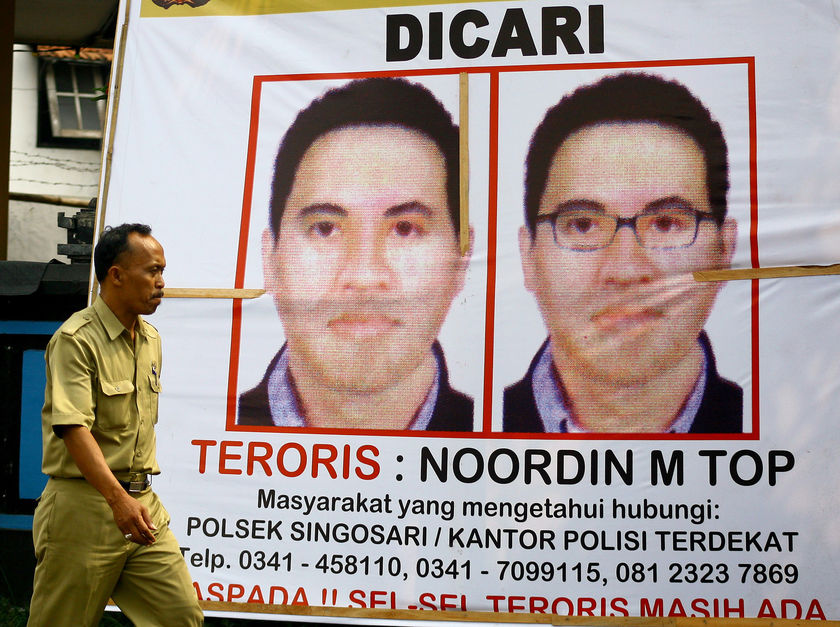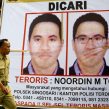
Indonesian Counter-Terrorism: The Great Leap Forward
Publication: Terrorism Monitor Volume: 8 Issue: 2
By:

Too often the news surrounding terrorism is dominated by the headline-catching acts of terrorism, such as last summer’s twin suicide bombings in Jakarta, or the take-down of terrorist operatives such as Dr. Azahari bin Hussin or Noordin Mohammad Top. Less is written about success in counterterrorism operations. No country deserves more credit for improving its counterterrorism operations and capabilities than Indonesia. While terrorism will never be eliminated, Indonesia has developed a strong and effective counterterrorist force, while at the same time consolidating its democratic transition. There is no other country in the world that can make this claim.
From 2002 to 2005, Indonesia was wracked by annual terrorist attacks perpetrated by a radical Salafist organization, Jemaah Islamiya (JI). JI’s 2002 Bali bombing remains the single most lethal terrorist incident after 9/11. That was followed by the August 2003 bombing of the JW Marriott hotel in Jakarta, the October 2004 bombing of the Australian Embassy and the October 2005 triple bombing in Bali. In November 2006, JI’s master bomb-maker, Dr. Azahari bin Hussin, was killed and his cache of 23 bag bombs was seized. That set the organization back a year. Counterterrorism operations in July 2007 led to the arrests of top JI leaders, including Zarkasih, the group’s spiritual leader, as well as seizures of large caches of explosives. In July 2008, a ten-person cell in Pekenbaru, Sumatra was taken down with the cooperation of Singaporean security forces. (AP, April 28, 2009; AFP, April 7, 2009). On July 17, 2009 JI was finally able to perpetrate mass-casualty attacks by detonating bombs in two luxury hotels in Jakarta.
There are several aspects to note. First, constraints in personnel and resources enabled JI to carry out only one mass-casualty attack per year. It is clear that JI’s leaders were unhappy with this tempo, and hence switched from car bombs to smaller bag bombs, used in the 2005 attacks and the 2009 bombings. Second, JI clearly demonstrated its ability to learn and adapt. In addition to shifting its tactics, JI’s leaders changed their operations in response to government security operations. In 2005, Noordin Top wrote a manual for cell maintenance and operations, which paralleled the philosophy of Musab al-Suri, a Syrian jihad ideologue who articulated a decentralized model of self-sustaining and autonomous cells driven by a common ideology. JI has remained a hard group to penetrate.
Indonesian security forces deserve credit for developing an elite counterterrorism police force firmly in civilian hands, Densus-88 (Detachment-88). The force, created in 2003, is well-trained, well-paid, well-led and free of the endemic corruption that permeates much of Indonesia’s police and bureaucracy.
But more than this, counterterrorism is perceived as politically legitimate because it has not come at the expense of the rule of law or democracy. In fact, only in Indonesia did counterintelligence actually strengthen democracy and rule of law. Unlike neighboring Malaysia or Singapore, which have relied on colonial-era internal security acts that allow for indefinite detention without trial, roughly 450 terrorism suspects in Indonesia have been charged and tried in courts of law or released. Though some sentences were light and annual amnesties that freed some 250 convicted terrorists caused diplomatic hassles, it was an important means for de-legitimizing JI. As the head of Densus-88, Brigadier General Tito Karnivian said Indonesia’s success was based on “law enforcement, prosecution and the judicial process. We do not use the military approach” (Financial Times, December 28, 2009).
This successful approach may be compromised by proposed legislation. In September 2009, the Indonesian government submitted revisions to its anti-terrorism law to Parliament. The proposed changes included lengthening the period of detention without trial from seven days to two years, should the suspect’s activities be deemed to endanger Indonesia’s security. The second proposed amendment would give the government the right to detain people and groups that glorify terrorism and openly incite violence against religious minorities (Straits Times [Singapore], September 2, 2009). The bill is still being debated. Though the police have had an anti-incitement law at their disposal, until lately they have not had the political cover to use it. Recently the police have suggested that this has changed. As a top police official said:
"If any preacher is found to have uttered provocative words or broken the law (by preaching hatred), we will definitely take action against him. We won’t hinder dakwah [Arabic “dawa”], the spread of [the] Islamic message, but we will try to be embedded there, be more transparent and do direct monitoring. We are just stepping up surveillance all over the country because the threat of terrorism remains real and frightening (Straits Times, August 22, 2009)."
But counterterrorism operations were successful for another reason as well. In a mid-2007 raid on a JI safe-house, a document that outlined JI’s new structure was recovered. That document identified Poso, Sulawesi, as a central front in the group’s regeneration. Poso, along with Ambon province, was the scene of intense sectarian bloodletting from 1998-2001, which continued to simmer through 2004-05. Though the conflict bore out of local reasons, JI quickly became involved and escalated the degree of violence. Thousands of people were killed in the bloodshed that JI used to set up a network of paramilitary forces and Islamist charities. Indeed, many in JI had long supported such a strategy, deeming the Qaeda-style campaign of bombing Western interests to be counter-productive to the group’s interests. That document, along with the arrest of several JI operatives, convinced the government to take sectarian violence seriously and not to let these conflicts fester. But after documents were recovered that explicitly identified the conflict zones as the centers of JI’s regrouping, the government has been very proactive.
The death of bomb-maker and financier Noordin Top in a September, 2009 Densus-88 raid was a blow to JI (Jakarta Globe, September 17, 2009). He was a very charismatic individual and it takes a special skill set to be a recruiter for suicide bombers. He had strong organizational skills and ran a network resilient enough to sustain him all these years while perpetrating attacks under a dragnet. He was a financier with links to Middle-East financiers and was clearly a proponent of an al-Qaeda ideology when many JI members were beginning to see such a strategy as counter-productive. Noordin Top’s operational savvy will be hard, but not impossible, to replicate.
Despite these gains, Indonesian security forces are realistic about the challenges ahead. Noordin’s network was stronger than first thought and they have seen JI continue to recruit (Reuters, December 29, 2009). While top operatives have been killed or arrested in the past few years, technical proficiency has been transmitted and a new generation of leaders is emerging. There has been no evidence of out-right factionalism, nor have there been any mass defections.
There are four other issues that are cause for alarm:
• Since 2004, JI has been moving into the provision of social services. [1] The number of JI-related charities has proliferated, all with the government’s approval. Despite their designations by the United Nations Security Council’s Al-Qaeda and Taliban Sanctions Committee, Mohamad Iqbal Abdurrahman (a.k.a. Abu Jibril) and Abu Bakar Ba’asyir have been active in fundraising, social-welfare activities, humanitarian relief and dakwah. The government believes they can be weaned off of terrorism, though skeptics tend to see this as an opportunity to openly recruit and regroup until the security and political environment are more favorable. Indeed, many of these charities have expanded their international operations. The Medical Emergency Rescue Committee Indonesia (MER-C), for example, has been active in Gaza, despite the Egyptian government’s attempts to expel them, as well as in southern Thailand (Jakarta Post, February 10, 2009).
• A second concern is the emergence of home grown militants, radicalized on the internet, seeking training overseas. This has already been the case in Singapore, where there have been five arrests of home-grown militants. This is a new phenomenon that will require new tools and tactics. Moreover, there is concern about new splinters. In early 2009 a new group calling itself al-Qaeda in Southeast Asia announced its formation through a number of media interviews and web postings (Straits Times, March 14, 2009).
• The third factor is beyond Indonesia’s control, but of paramount concern to them: the ongoing conflicts in the southern Philippines, Thailand and Pakistan. Sadly, neither the Philippine nor the Thai governments have demonstrated the capacity or will to resolve these festering conflicts. It is not that there are large numbers of Indonesians traveling to these hotspots, but all play a role in the radicalization of Indonesians and fuel the jihadist narrative, as well as provide safe havens and opportunities to train in small numbers. In Pakistan, there is an additional concern that the government continues to lack the political will to crackdown on the Lashkar-e-Taiba (LeT), an organization with a global network that has worked closely with JI in the past.
• Finally, Indonesia’s much-discussed disengagement program has not been as successful as the government claims. For one thing, it is absolutely starved of resources and has none of the ancillary or follow-up aspects that are features of Singapore or Malaysia’s programs, such as the provision of social workers, psychologists, parole officers and family counseling programs. Indonesia’s program isn’t really a program at all; it is an ad hoc response conducted by a handful of JI members who have renounced violence. The disengagement program lacks any post-release monitoring. There have been several known cases of recidivism, including one of the suicide bombers in the 2009 Jakarta bombings.
In sum, once Indonesian leaders developed the political will to crackdown on JI, an institutionalized counterterrorism program which upheld the rule of law and respected the country’s democratic gains was put in place. While terrorism will remain a fact of political life in the world’s largest Muslim country, its potential to jeopardize the state has decreased considerably.
Notes:
1. Zachary Abuza, "Jemaah Islamiyah: Indonesia’s Hezbollah," Middle East Quarterly (Winter 2009).






